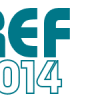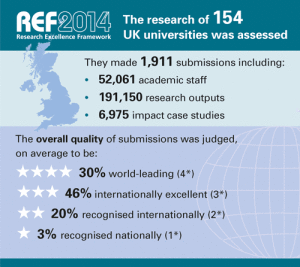
There is a lot of interest in the outcome of the UK’s Research Excellence Framework (REF) right now. This is the exercise that every six years or so, assesses and ranks the quality of research in Britain’s universities – across all institutions and subject areas, using a common rating scale. For each subject area, research is assessed on the quality of the outputs, the ‘environment’ in which it is being pursued, and also the ‘impact’ it is having. It is a controversial process that sparks much debate, but it is taken very seriously by the university sector and it is a key driver of prestige and research income. The results therefore make interesting reading.
Palliative care and the REF
Katherine Sleeman and Fliss Murtagh recently wrote about the challenges that face palliative care research as it seeks to advance and consolidate. So the REF 2014 results will be important in assessing how well the field is doing. Unfortunately that cannot be done easily. There is no subject specific category (known as a Unit of Assessment) for palliative care research. This means that research work relating to palliative care can be ‘returned’ under a variety of disciplinary headings, according to the make-up of the palliative care research teams, the particular interests of their members, and the strategic choices about ‘placement’ that are taken by their institutions.
As a result the ‘outputs’ of palliative care research require a research project in itself before they can be identified. This can be done once the full details of each institution’s REF returns are placed in the public domain at some point in early 2015. I will be eagerly looking out for this and planning to build on a study we published on the subject after the last exercise, when the process was known as the Research Assessment Exercise (RAE).
In that study we reported on the place of research on supportive, palliative and end-of-life care within the United Kingdom Research Assessment Exercises of 2001 and 2008. The results were fascinating.
We found that 67 Higher Education Institutions in 2001 and 66 in 2008 contributed research work to the RAE relevant to supportive, palliative and end-of-life care. This comprised 16 subject areas in 2001 and a remarkable 25 subject areas in 2008, and was generated by 178 authors in 2001 and 176 authors in 2008.
Seven ‘high-intensity groups’ of concentrated palliative and end of life care research activity were identified in 2001, and eight such groups in 2008. Between the years little growth occurred in contributions to the RAE relating to supportive, palliative and end-of-life care, and the ‘high-intensity groups’ remained relatively fragile – some disappeared completely and others emerged between the two dates. With one exception, there was no concentration of effort in clinical studies relating to the medical aspects of supportive, palliative and end-of-life care.
By 2008 there were still less than 40 individual academics in the UK with major commitments to research in supportive, palliative and end-of-life care, as measured by their RAE participation.
REF 2014
How will all of this look for the 2014 exercise? We have devised a method to find out and to compare results over three cycles of research assessment. We will also be able to look closely at the ‘impact case studies’ submitted this time by the universities. These may well include palliative care components – and these too have also been graded on the common scale.
I admit that some of this could appear to be on the ‘nerdy’ end of the research continuum. But it is more than navel gazing – it provides solid evidence of how the field of supportive, palliative and end of life care is growing in its research endeavours, where the centres of excellence can be located, and how this is changing over time. I am looking forward to analysing REF 2014 in more detail from the perspective of palliative and end of life care, just as soon as the data are available.
And in case you are wondering … at the University of Glasgow, research relating to palliative and end of life care was ‘returned’ to the Social Policy subject area. The work of our group as a whole was rated: best in Scotland, fifth in the Russell Group and eighth in the United Kingdom (out of 62 returns). More than three quarters of our research outputs were judged to be world-leading or internationally excellent; 60% of our impact submission was judged to be outstanding; and our research environment was assessed as being conducive to producing research of world leading (62.5%) and internationally excellent (37.5%) quality. A nice place to be and a great basis for developing future strategy. REF 2020 will be with us soon!!!


